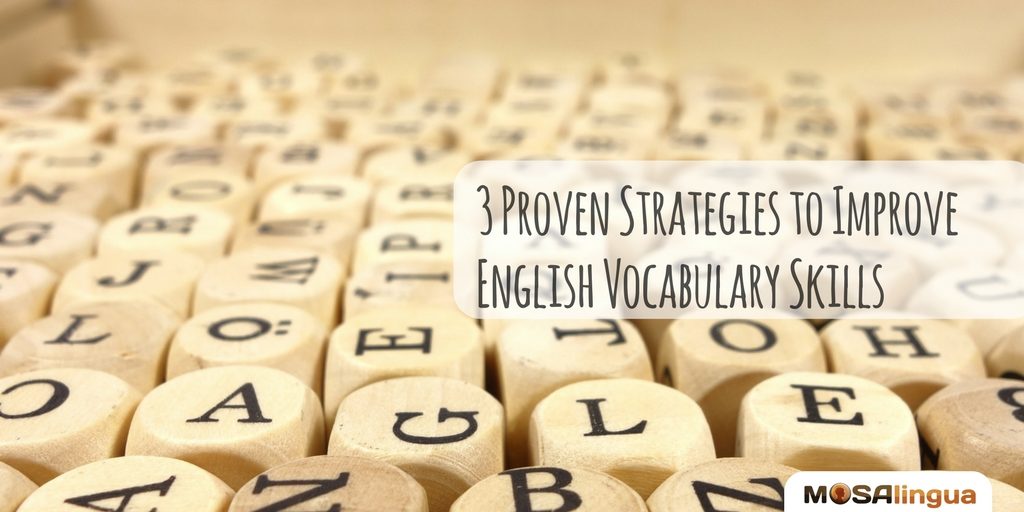There are tons of strategies out there to help you improve your English vocabulary skills quickly and effectively. Below, you’ll find 3 vital concepts that are free and proven to work.

Ways to Improve English Vocabulary While Reading
A common misconception about language learning is that some people are good at it, and others are not. And yet at some point, we all had to learn a “new” language as infants and toddlers. Nobody is born speaking their native language. You most likely don’t remember your first words. Building your vocabulary to the point of being able to communicate is a long and complex learning process. But most of it (besides vocabulary or spelling quizzes at school) happens subconsciously.
Similarly, the most effective method for learning a foreign language is immersion. We don’t mean traveling – although that’s always a great idea, as we talk about in this article about the benefits of globetrotting. Instead, all you have to do is maximize your study time.
Work That Brain!
And reading is one way to do that! Before we dive into our reading strategies, let’s look at what it means to get exposure to a variety of reading material to improve your English vocabulary and comprehension.
Different formats
Believe it or not, comprehension can change depending on whether you are reading in an electronic or print format. Some people believe that print formats such as books, newspapers and magazines promote more engaged reading. But actually, most experts find that each format has its pros and cons (check out this article for more info!). A mixture of different formats keeps you engaged and your brain guessing. Which is exactly what you need to do to improve your vocab!
Different genres
Try to imagine all the different ways that people talk. How you speak to your parents is surely different from the way you’d talk to a shop owner. Which is different from how you talk with your friends. And there are also different tones and registers in writing. Every time you switch to a different genre (like fiction, scientific articles, or poetry) or type of writing (opinionated, informational, etc.) you’ll learn words that you’ve never heard before.
Try out a different style of writing every now and then. If you typically read the newspaper every day, go for a humor piece or even a comic book. We put together a list of English books to get you started.
Also, remember that newspapers usually have a political slant. Do you know how the newspapers you read lean? If so, find an article from a newspaper that leans the opposite way. Remember that you don’t always have to agree with what you read. In fact, getting a look at the opposite side’s argument can only help clarify your own views. You may also learn how language can be biased, which will give you a more nuanced understanding of vocabulary.
3 Strategies to Improve English Vocabulary Skills
The strategies below are metacognitive, meaning they involve thinking about your thinking. That may sound crazy, but humans learn by repeating and “recycling” ideas. When you learn, you use certain cognitive strategies to understand what you’re reading. A metacognitive strategy means taking a second to fully digest what you’ve read in order to better interpret it. By the way, this article is all about reading as a way to learn vocabulary. But there are other ways to learn English vocabulary, too! Don’t forget to work English pronunciation and speaking, listening practice, and writing into your daily practice.
Whether you’re learning new concepts or reviewing old ones, these techniques can help you retain and understand what you read.
1. Paraphrasing
To paraphrase is to summarize or to re-word. Have you ever tried to memorize a speech, only to completely blank out later on? Or maybe you’ve read a book for a test. Except in your essay you couldn’t exactly explain the themes or character development very well.
As analytical beings, we have profound interpretation skills. But it still takes practice. So, when you read something, let yourself simmer on what you’ve read. Take a second to try and paraphrase or summarize the passage in your own words. (This also works with grammar.)
To improve your English and expand your vocabulary, you can also look to context. If you come across an English vocabulary word you don’t know, don’t get stuck focusing in on that word. Read everything around it for help! Try to summarize what the sentence is saying, substituting a logical word. For example, consider this sentence:
“My grandmother constantly talks about antediluvian values that no longer apply to today’s industrialized society.”
You may not know what antediluvian means (I didn’t either). But by looking at the rest of the sentence, you might be able to talk yourself through it. Did you deduce that it means ancient or outdated? You’re right!
You don’t have to understand every individual word to get the gist. So paraphrasing is great for working through passages’ overall meaning and getting around unfamiliar vocabulary words.
2. Contextualizing
We mentioned that newspaper articles may have a political bias. All writing is a reflection of the author’s society, culture, history, as well as their individual personality and objectives. One method for understanding reading passages of all kinds is to think about the broader context.
Who is the intended audience? If it is a magazine article, who reads this type of magazine? Is the author’s goal to make readers learn something new, or reflect on a topic in a different way?
Thinking about these questions can help frame your reading in a more meaningful light. If you understand the context of the reading, you can also better comprehend the nuances of vocabulary words. In more controversial pieces, you may find stronger, more impactful verbs, while a humorous text may use colloquial expressions. Since it’s important to understand when it is appropriate to use certain words, contextualizing can provide a strong basis for knowing how to use vocabulary correctly.
3. Reacting
We’ve talked before about how important it is to get engaged in the learning process in whatever ways work best for you.
You don’t necessarily need to argue with yourself aloud (but self-conversation is another good tactic!). However, reacting to what you read is an important part of higher-level language skills. When you read something you don’t understand, you might feel confused. To be able to formulate a response to a reading means that you’ve related it to what you know. That’s a great step towards fluency, and one way to broaden your vocabulary.
Mentally react to how a certain passage conflicts with your views. Or think about how a concept works differently in your native language. The point is to ponder what you’re reading and engage with the material.
There are tons of strategies besides these, of course, and what one person likes another may not. Let us know in the comments section below if you have any techniques for improving your comprehension skills and vocabulary!







Comments